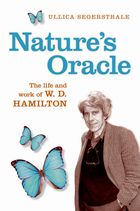 Ullica Segerstrale, professor of sociology and director of the Camras Scholars program, has published Nature’s Oracle: The Life and Work of W.D. Hamilton (Oxford University Press, 2013). It has been reviewed by the Economist, Guardian, Telegraph, Nature, and other media, and Segerstrale gave a public presentation about it in March at Oxford University. She will give a lecture, “The Edge of Creativity: A Look at the Scientific Life of W.D. (Bill) Hamilton,” with reception and book-signing at IIT on May 2 from 3:15-4:50 p.m. in Perlstein Hall Auditorium.
Ullica Segerstrale, professor of sociology and director of the Camras Scholars program, has published Nature’s Oracle: The Life and Work of W.D. Hamilton (Oxford University Press, 2013). It has been reviewed by the Economist, Guardian, Telegraph, Nature, and other media, and Segerstrale gave a public presentation about it in March at Oxford University. She will give a lecture, “The Edge of Creativity: A Look at the Scientific Life of W.D. (Bill) Hamilton,” with reception and book-signing at IIT on May 2 from 3:15-4:50 p.m. in Perlstein Hall Auditorium.
“Nature’s Oracle is a study of extraordinary lifelong creativity and the agony and ecstasy of scientific discovery,” said Segerstrale. “He effortlessly crossed disciplinary boundaries, feeling like an artist and reasoning like an engineer.”
Hamilton (1936-2000) was a Royal Society Research Professor at Oxford University described as “Darwin of the 20th century.” He won many international honors and awards, including the Crafoord Prize of the Royal Swedish Academy of Sciences (an annual science prize intended to complement the Nobel Prizes) and the Kyoto Prize. Hamilton especially addressed two questions left unanswered by Charles Darwin: how can altruistic behavior ever make evolutionary sense, and what is the evolutionary point of having sexual instead of asexual reproduction? He also went on to solve many other puzzles, opening up and structuring ever-new research fields.
Why do animals sacrifice their lives, or work for other animals? Hamilton said it’s because what matters is not the survival of the individual, but the survival of its genes, and that related animals will help each other. “Hamilton’s rule,” which he developed as a doctoral student, put these ideas into a mathematical model. This introduced his new paradigm for the study of all types of social behavior. Hamilton’s insights were later popularized in Richard Dawkins’ The Selfish Gene and E. O. Wilson’s Sociobiology.
Oxford University Press says, “Segerstrale captures Hamilton’s extraordinary life and work, revealing a man of immense intellectual curiosity, an uncompromising truth-seeker….Segerstrale’s detailed research reveals the internal tensions and conflicts behind Hamilton’s creative genius. The book shows how Hamilton throughout his life was a man against the grain, whose iconoclastic views challenged the scientific and medical establishment…whose work was invariably attacked upon publication and only later proclaimed a major breakthrough.”
Segerstrale holds a Ph.D. in sociology from Harvard. She has held the position of senior researcher at the National Academy of Finland, Fulbright Fellow, fellow of the Center for Interdisciplinary Research in Bielefeld, Germany, and visiting professor at the Swiss Federal Institute of Technology in Zurich (ETH). Her research has been supported by among others the Guggenheim Foundation, the American Philosophical Society, the Sloan Foundation, and the Rockefeller Foundation. She is a member of the World Academy of Art and Science, the European Academy of Sciences and Arts, and the Finnish Society of Sciences and Letters. To learn more, see her faculty page. For more information about the book, visit OUP’s site.

